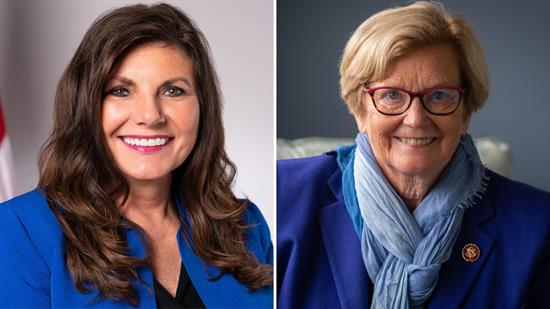Press Releases
Reps. Pingree, Harshbarger Introduce Bipartisan Bill to Ensure Medical Students Have Equal Access to Residency ProgramsThe bipartisan Fair Access in Residency Act will help to support equitable treatment of osteopathic medical students, and increase access to high-quality, patient-centered healthcare in rural and underserved areas.
Washington,
September 15, 2022
U.S. Representatives Chellie Pingree (D-Maine) and Diana Harshbarger (R-Tenn.) today introduced legislation to remove barriers and inequities from federally funded physician residency programs. The bipartisan Fair Access in Residency (FAIR) Act, which is strongly supported by the American Association of Colleges of Osteopathic Medicine (AACOM) as well as the University of New England College of Medicine (UNECOM), aims to ensure parity in Medicare-funded graduate medical education (GME) programs that frequently exclude or impose burdensome requirements for Doctors of Osteopathic Medicine (DOs). “As one of the fastest growing health professions in the country, Doctors of Osteopathic Medicine provide essential care in our communities, particularly in rural and underserved areas. It’s ridiculous that osteopathic medical students are facing discrimination and extra hurdles to accessing federally funded residency programs. The FAIR Act will help to ensure more accountability from these programs,” said Pingree. “I’m proud that so many dedicated DOs are being trained in Maine and across the country. We should be helping them serve patients without unnecessary barriers, which is exactly what this legislation aims to do.” “I am proud to help lead legislation that has the ability to transform accessibility to DOs across the country and strengthen our physician pipeline, especially in rural and underserved areas. It’s more critical now than ever that we ensure our taxpayer-funded residency training programs are equally deploying all the best talent of tomorrow’s doctors and specialists, from both DO and MD educational backgrounds,” said Harshbarger. “This bill is an important step toward ensuring transparency and equality in our taxpayer-funded GME programs, with the ultimate goal of increasing the number of physicians trained and serving our communities.” “We appreciate Reps. Harshbarger, Pingree and Graves’ effort to address the unfair barriers and discrimination that osteopathic medical students face when applying to federally funded residency training,” said AACOM President and CEO Robert A. Cain, DO. “Ensuring that osteopathic medical students have an equitable path to residency not only reflects the spirit of single accreditation, which was designed to increase access to residency programs for both DOs and MDs, but it also addresses persistent and prevalent biases against osteopathic medical students, many of whom will go on to care for patients in rural and medically underserved communities. We also thank our peer organizations for supporting this vital bill.” "While our partners in Maine have always supported UNE's osteopathic medical students, the same is not true in other parts of the country," said UNE College of Osteopathic Medicine Dean Jane Carreiro, D.O. "Outside of Maine, UNE COM students have faced barriers to residency, including being excluded from doing rotations or being interviewed, and being required to take the M.D. licensing exam (USMLE) which is not required for D.O. licensing, an additional expense and stress. The FAIR Act will remove these barriers for osteopathic medical students and will move us closer to addressing the physician workforce shortage across the nation." The FAIR Act requires federally funded GME programs to:
Background: Osteopathic medicine is one of the fastest growing health professions in the United States and colleges of osteopathic medicine are now educating 25 percent of all medical students. DOs are meeting our nation’s health care needs, prioritizing primary care specialties, and practicing in rural and underserved areas at notably high rates. Physician distribution is influenced by training location, and more than 73 percent of DOs practice in the state where they do their residency training. Unnecessary and unfair residency criteria negatively impacts physician distribution leading to disparities in health care access. According to National Resident Matching Program data, 36 percent of residency program directors never or seldom interview DO candidates. Furthermore, the American Medical Association’s Fellowship and Residency Electronic Interactive Database Access shows that 32 percent of residency programs mandate that osteopathic medical students take the MD licensing exam, even though the DO licensing exam grants physicians unrestricted practice rights in all 50 states. ### |

